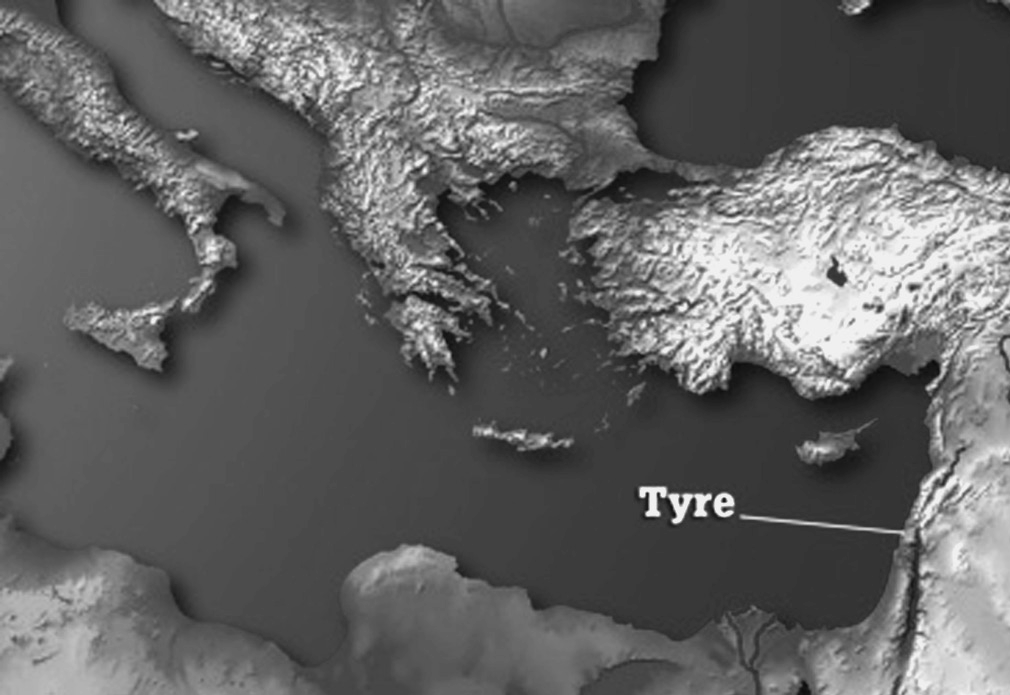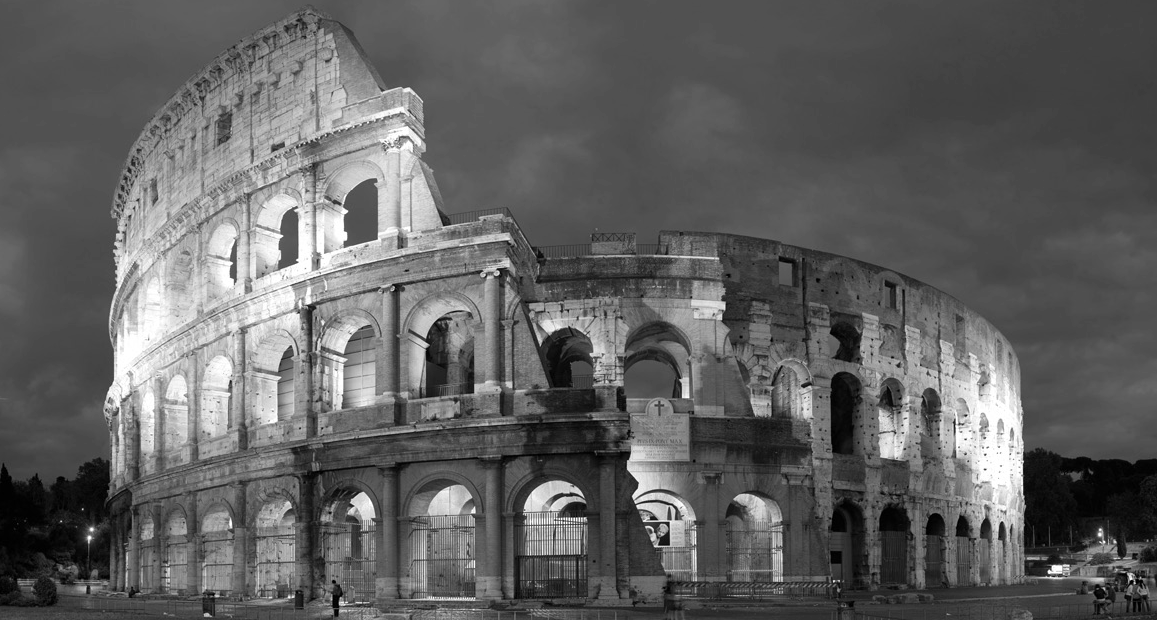Prophecies Against Rome Addressed to Tyre
TIRAS, THE ETRUSCANS, ROME
The list of first‑generation nations from Japheth ends with Tiras. Their homeland was at the west and southwest of the Black Sea, where Romanians today call it Thracia, and in English we slur it to Thrace. Its capital was called Troy, or Troas, and the people were called Trojans.
Like other seafaring nations, these people established colonies on faraway shores, including Tyre, Rome, and later Carthage long after the 12th century BC, when the Greeks destroyed Troy. The first inhabitants of Rome and points north to Florence were the Etruscans, a name which may be derived from iter‑Tiras, the going of Tiras, or distant‑colony of Tiras. The part of the Mediterranean Sea west of Italy is still known as the Tyrrhenian Sea, the waters of Tyre.
The animal used by Thrace to symbolize itself was the wolf. That Rome was founded (about 753 BC) with assistance from the remnants of Thrace is preserved in the myth of Romulus and Remus being suckled by a wolf.
Long after the founding of Rome, Thrace was conquered by the Greeks and incorporated into the Greek Empire of Alexander (the Great, according to the Greeks; the Terrible, according to the Persians). After the death of Alexander, Lysimachus (died BC 281) took Thrace for his quarter. Thus had Daniel 8:8‑9 prophesied, “The he‑goat [Macedonia] magnified himself exceedingly: and when he was strong, the great horn was broken [Alexander died BC 323]; and instead of it there came up four notable horns toward the four winds of heaven. And out of one of them [Thrace, to the north] came forth a little horn [Rome], which waxed exceeding great, toward the south, and toward the east, and toward the glorious land.”
When later the Roman Empire expanded to include the west side of the Black Sea, it represented a return to the Thracian homeland of the Romans. The northern part is known as Romania today.
TYRE
When Tiras built a colony on the Mediterranean east coast, in Canaanite/Semitic territory, the terminal “s” was dropped, to become Tira, or Tyre (Hebrew, Tzur, whence “Big Sur”). Tyre enhanced its power by allying itself with Sidon, a major Canaanite city. Historians have labeled the peoples of the alliance as “Phoenicians,” although they were two separate ethnic peoples.
When it is recognized that Tiras/Thrace, Rome, and Tyre began as all one people, it can be understood why some prophecies against Rome are addressed to Tyre. Rome’s religious heritage was from Babylon, but its ethnic heritage was from Tiras, or Tyre.
Ezekiel chapters 26 to 28 prophesy against “Tyre,” where evidently they apply to Rome.

“Son of man, because that Tyre hath said against Jerusalem, Aha, she is broken that was the gates of the peoples; she is turned unto me; I shall be replenished, now that she is laid waste: (3) therefore thus saith the Lord Jehovah, Behold, I am against thee, O Tyre, and will cause many nations to come up against thee, as the sea causeth its waves to come up. (4) And they shall destroy the walls of Tyre, and break down her towers: I will also scrape her dust from her, and make her a bare rock. (5) She shall be a place for the spreading of nets in the midst of the sea; for I have spoken it, saith the Lord Jehovah; and she shall become a spoil to the nations. (6) And her daughters that are in the field shall be slain with the sword: and they shall know that I am Jehovah” 1 (Ezekiel 26:2‑6).

The Coliseum at Rome
“Say unto Tyre, O thou that dwellest at the entry of the sea, that art the merchant of the peoples unto many isles … Tarshish was thy merchant by reason of the multitude of all kinds of riches; 2 with silver, iron, tin, and lead, they traded for thy wares. (13) Javan, Tubal, and Meshech, they were thy traffickers; they traded the souls of man and 3 vessels of copper for thy merchandise” (Ezekiel 27:3, 12‑13).
“Son of man, say unto the prince of 4 Tyre, Thus saith the Lord Jehovah: Because thy heart is lifted up, and thou hast said, I am a god, I sit in the seat of God, in the heart of the seas; yet thou art man, and not God, though thou didst set thy heart as the heart of God; — (3) behold, thou art wiser than Daniel; there is no secret that is hidden from thee; (4) by thy wisdom and by thine understanding thou hast gotten thee 5 riches, and hast gotten gold and silver into thy treasures; (5) by thy great wisdom and by thy traffic hast thou increased thy riches, and thy heart is lifted up because of thy riches … (6) Because thou hast set thy heart as the heart of God … (7) I will bring strangers upon thee, the terrible of the nations; and they shall draw their swords against the beauty of thy wisdom, and they shall 6 defile thy brightness. (8) They shall bring thee down to the pit; and thou shalt die the death of them that are slain, in the heart of the seas. (9) Wilt thou yet say before him that slayeth thee, I am God? but thou art man, and not God, in the hand of him that 7 woundeth thee. (10) Thou shalt die the death of the uncircumcised by the hand of strangers … saith the Lord Jehovah” (Ezekiel 28:2‑10).
— Br. James Parkinson
(1) After Nebuchadnezzar, the city was rebuilt on an island one mile offshore. Alexander, ca. BC 322, destroyed the on‑shore city, and in a seven month siege took all materials from shore, and even scraped the soil to bare rock, to build a causeway to the island to destroy it. (The island is now washed away.)
(2) The Celts mined silver, iron, and lead in Spain, and tin in Cornwall (Southwest England). Compare Genesis 10.
(3) Armenia (Meshech) had the copper mines, Georgia (Tubal) was the great center for refining it, and Greece (Javan, Ionia) fabricated the copperware.
(4) Tiras (Thrace) colonized Tyre, Rome, and Carthage; they were ethnically one people.
(5) Or, power, And twice in verse seven.
(6) Or, profane.
(7) Or, profaneth thee.
